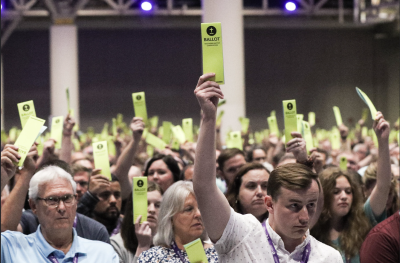A free church in a free state is still the Christian ideal

As Southern Baptists came together for their annual convention this week in Indianapolis (June 11-12), they made emphasizing their enormous commitment to religious liberty a high priority. They did so by passing an eloquent resolution explaining and championing beliefs that historically are closely identified with the Baptist religious tradition.
When the Reformation shook and reshaped European civilization in the sixteenth century, Lutheranism and Calvinism gave Western Christianity a renewed emphasis on salvation by faith alone in Christ alone. It was left to the Anabaptists in Switzerland and the Baptists in England and America to recover the concept of the local, visible church of the Lord Jesus Christ as made up of people who had consciously professed Jesus as Savior and Lord (i.e. no parish church and no infant baptism).
Accompanying this belief in the redeemed church was a commitment to freedom of conscience and no government persecution based on religious belief—religious liberty or “soul freedom.”
In 1612 Thomas Helwys penned The Mystery of Iniquity, the first published plea in the English language for religious freedom. Helwys reminded the King of England, James I, that he was a “mere man” and had no right to dictate religious beliefs to other men.
A few years later the Puritan Roger Williams escaped the Massachusetts Bay authorities and founded Providence Plantations (Rhode Island), the first government in the Western World for more than a millennium where people were free to worship as they pleased on Sunday morning, or alternatively, stay home and shuck peas on the front porch, without fear of being arrested for breaking sabbath laws.
Roger Williams argued that for any man to coercively interfere with another man’s relationship with his Creator was “soul rape.”
As Baptists flourished in America during the First Great Awakening (1734-1775), they increasingly rebelled against the official state churches in nine of the original thirteen American colonies.
In the end, with a massive assist from Thomas Jefferson, the Baptists won the argument about the separation of church and state, culminating in the ratification of the First Amendment in 1791, which reads:
“Congress shall make no law respecting an establishment of religion, or prohibiting the free exercise thereof, or abridging the freedom of speech, or of the press, or the right of the people peaceably to assemble, and to petition the Government for a redress of grievances.”
Freedom of religion and separation of church and state are the unique Baptist contributions to the Reformation heritage and it has been instrumental in the flourishing of religious faith in the United States compared to the ossification of the state churches of the Old World.
Standing squarely and proudly in that tradition, Southern Baptists overwhelmingly passed a resolution “On Defending Religious Liberty” this week, noting that “religious liberty” was “the ‘first freedom’ to be articulated in the Bill of Rights.”
Given the considerable debate and attention being given to the role religion should or will play in the 2024 election cycle in the United States, Southern Baptists wanted to explain the right way and the wrong way to involve religious conviction in the public square and in elective politics.
The resolution encouraged and supported “robust Christian engagement in the public square while also opposing any effort to establish a state religion of any nation, including the United States of America” and rejected “any government coercion or enforcement of religious belief….”
Finally, in conclusion, they resolved, “That we object to any suggestion that our historic, God-given distinctive of religious liberty should be abandoned in favor of a state-mandated religion.”
As a lifelong Southern Baptist, I am extremely grateful that my fellow Southern Baptists have reaffirmed their bedrock belief in seeking to bring their Christian convictions into the public square and protecting everyone else’s right to bring their convictions to bear as well.
Dr. Richard Land, BA (Princeton, magna cum laude); D.Phil. (Oxford); Th.M (New Orleans Seminary). Dr. Land served as President of Southern Evangelical Seminary from July 2013 until July 2021. Upon his retirement, he was honored as President Emeritus and he continues to serve as an Adjunct Professor of Theology & Ethics. Dr. Land previously served as President of the Southern Baptist Convention's Ethics & Religious Liberty Commission (1988-2013) where he was also honored as President Emeritus upon his retirement. Dr. Land has also served as an Executive Editor and columnist for The Christian Post since 2011.
Dr. Land explores many timely and critical topics in his daily radio feature, “Bringing Every Thought Captive,” and in his weekly column for CP.





















